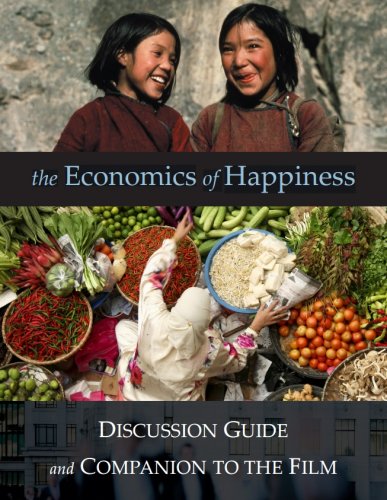This discussion guide follows the film, chapter by chapter, expanding on the arguments and pointing to a wealth of resources for further learning, reflection and action. Each chapter begins with a short essay elaborating on the film, followed a set of suggested discussion questions and activities, a short list of recommended readings, links to related organizations, and links to other learning resources (films, lectures, tool-kits, slideshows, etc.).
The discussion guide and companion to the film is an education-for-action resource. As with the film, we hope it empowers you to take back the economy from the “experts”, join the global movement for economic localization, and help create a genuine economics of happiness.
The Economics of Happiness describes a world moving simultaneously in two opposing directions. On the one hand, an unholy alliance of governments and big business continues to promote globalization and the consolidation of corporate power. At the same time, people all over the world are resisting those policies, and – far from the old institutions of power – they’re starting to forge a very different future. Communities are coming together to re-build more human scale, ecological economies based on a new paradigm – an economics of localization.
The film shows how globalization breeds cultural self-rejection, competition and divisiveness; how it structurally promotes the growth of slums and urban sprawl; how it is decimating democracy. We learn about the obscene waste that results from trade for the sake of trade: apples sent from the UK to South Africa to be washed and waxed, then shipped back to British supermarkets; tuna caught off the coast of America, flown to Japan to be processed, then flown back to the US. We hear about the suicides of Indian farmers; about the demise of land-based cultures in every corner of the world.
The second half of The Economics of Happiness argues that economic localization is a strategic solution multiplier that can solve our most serious problems, and spells out the policy changes needed to localize our economies. We are introduced to community initiatives that are moving the localization agenda forward, including urban gardens in Detroit, Michigan and the Transition Town movement in Totnes, UK. We see the benefits of an expanding local food movement that is restoring biological diversity, communities and local economies worldwide. And we are introduced to Via Campesina, the largest social movement in the world, with more than 400 million members.
Table of Contents
Director’s Note
Introduction
- Ladakh
- What is “Globalization’?
- Globalization Makes us Unhappy
- Globalization Breeds Insecurity
- Globalization Wastes Natural Resources
- Globalization Accelerates Climate Change
- Globalization Destroys Livelihoods
- Globalization Increases Conflict
- Globalization is Built on Handouts to Big Business
- Globalization is Based on False Accounting
- What is Localization?
- Local Business and Banking
- Local Food
- Local Energy
- Local Identity, Local Knowledge
- Localizing, Globally
- Local Futures
Format





